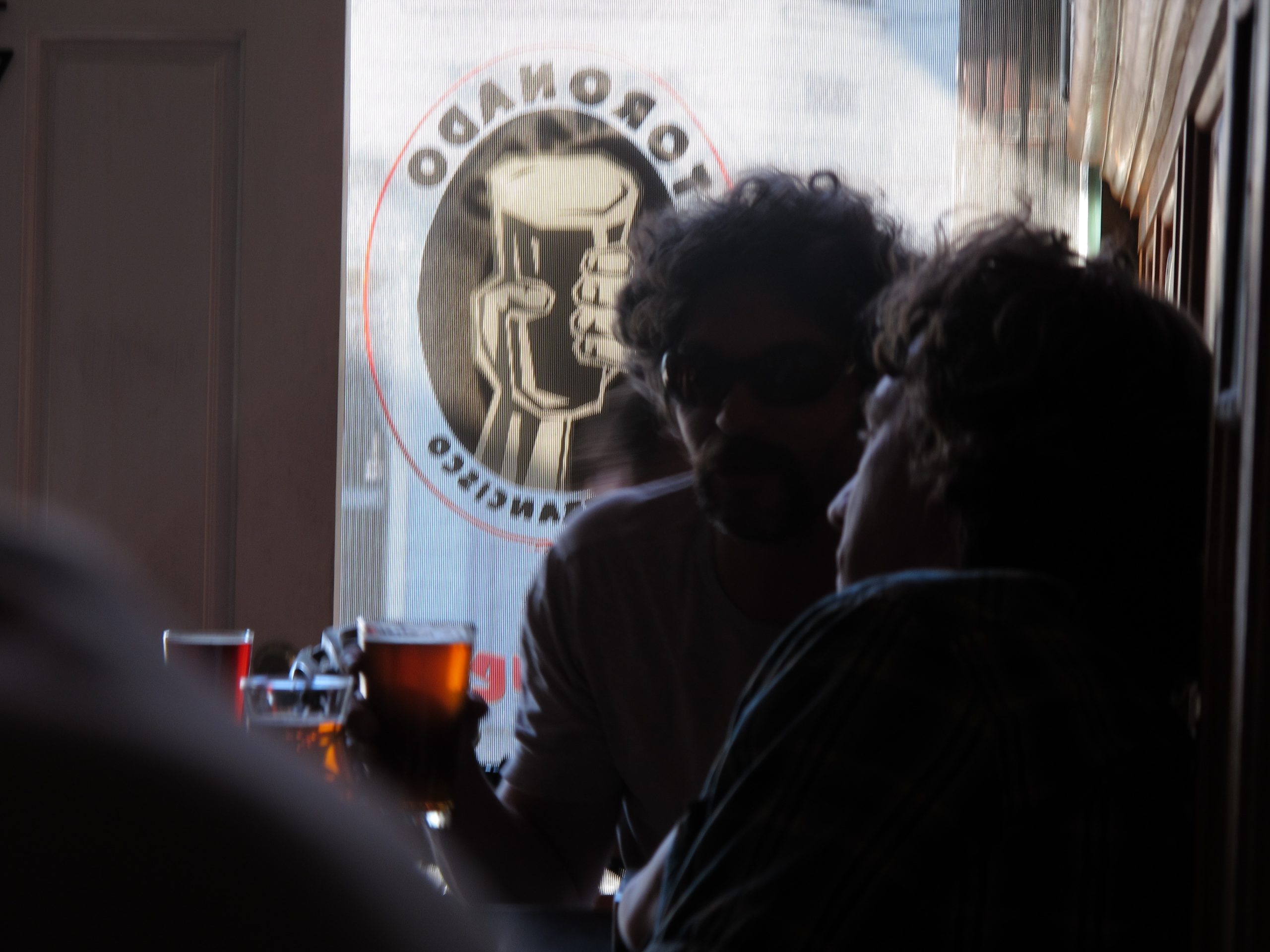It’s been a weird few months for Toronado. Given the celebrated beer bar’s colorful history, that’s really saying something.
In January the 38 year-old Toronado brand, the state license, the glassware, the building, and what the real estate brochure called the “patina” was listed for sale at a surprisingly modest $1.75 million. Fans, patrons and employees of San Francisco’s most celebrated craft beer bar grappled with the news that the beloved cash-only dive may soon have a new owner, wondering what that would mean for the future.
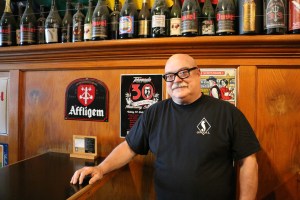
On March 27, the San Francisco Standard reported that Orion Parrott, general partner at a firm that mentors and funds cryptocurrency startups, was set to become the new owner as soon as the contingency period concludes.
The story cited leaks from a private chat in the Telegram app where Parrott solicited investments among his crypto industry peers. His proposal touted an opportunity to develop the bar into “the next great San Francisco food & beverage brand in the steps of Blue Bottle (acquired $700 M val.) and La Boulange (acquired $100M).”
He also floated the idea of launching “some kind of coin” to promote and possibly fund operations.
The disclosures prompted immediate outcries from many Toronado fans. Could anything be more incongruous?
The expected contingency timeline came and went with no announcement. Time became elastic. The bar continues on as it has since 1987, serving pints to the faithful and the curious. The Toronado exists in limbo.
A fork in the road
In early February on San Francisco’s lower Haight Street, under a rare Anchor Christmas Ale neon, the top half of a well-worn Dutch door stood wide open, blasting metal music and raucous conversation onto the evening sidewalk. Inside, a boisterous crowd kept their leather jackets and hoodies on as cold air swept in. The crowd peered at the huge board of offerings, looked up breweries on their phones, and took in the scene.
Around them hung bar trophies, including a battered race car side panel emblazoned “Racer 5,” a phalanx of autographed Duvel jeroboams from celebrations past, a huge “Garage Service” neon, and impressively sticker-festooned walls.
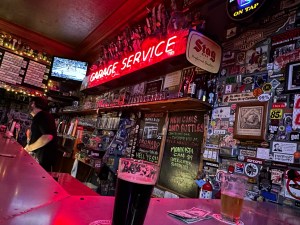
Old friends saw the uncertainty in one another’s eyes. The challenge was simple yet thorny: could anyone solve the puzzle of a new mortgage and expensive deferred maintenance while keeping the vision alive and the beer affordable?
But not every patron had the end of an era hanging over their head. An hour earlier a small keg of Russian River Brewing Co.’s Pliny the Younger, the region’s enduring seasonal It Beer, had been tapped and quickly polished off by regulars and Younger-chasers. Many lingered barside, their attention now directed to elusive treats from other breweries such as Monkish Brewing Co. and Cantillon.
Across the room, a small knot of industry veterans waited, watching the door. Dave Keene, Toronado’s founder, was supposed to make a rare appearance, his first since the sale was announced.
When he finally arrived, half of the room erupted in cheers, while the other half turned their heads in puzzlement.
“I told my Uber driver I felt like I was late to my own wake,” Keene said to the welcoming crowd.
It wasn’t really a wake for “the T,” as some of its intimates call it — not yet. And after nearly four decades, Keene has undoubtedly earned his retirement.
As Moonlight Brewing Co.’s Brian Hunt put it, “David has made such contributions to the world of craft beer. When does he get to harvest that?”
From Neighborhood Hideout to Beer Destination
Keene opened his bar in 1987, in a Lower Haight district struggling through the crime of the crack era. The neighborhood wasn’t trendy — it was rough, rebellious, resolute. And, especially with the help of a federal small business loan to purchase the building, affordable.
Toronado started simply. Plain blue walls and two beers on tap — San Francisco’s unique gold rush heritage Anchor Steam beer and John Courage Pale Ale from England. It quickly became a haven for artists, misfits, and bikers — like Keene himself.
As the microbrew movement sprung to life, Keene sought out new beers. He took 15 corny kegs, designed to dispense soda, and drove them to tiny Anderson Valley Brewing Co. in rural Booneville two hours north.
After loading down his Honda Civic, the brewery crew had to push the car over the hump onto the highway so he could head back to the city with his exclusive libations. As soon as Anderson Valley began distributing to Toronado and elsewhere, he began to fill up those corny kegs at the nascent Marin Brewing Co.
In 1989, a Chimay sales rep convinced Keene to visit Belgium and the bar changed again. Enamored with strong beers like Duvel, he came back even more determined to expand Toronado’s offerings. Gradually, people who knew something about beer discovered the bar and the neighbors who went to the bar discovered beer.
Barleywine — the style revived by local Anchor Brewing Co. in the 1970s — had caught Keene’s attention. Curious about the few examples that had cropped up, he bought four kegs from four breweries to taste side by side at a small barleywine festival. Over the years the Toronado Barleywine Festival inspired brewers to create batches of the esoteric heavy ale in hopes of being included.
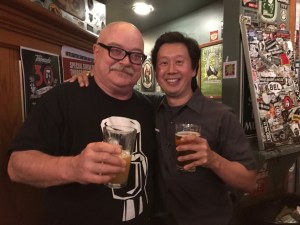
Gradually, Toronado transformed from a scrappy watering hole into a revered institution. “Broadway for brewers,” as Tomme Arthur of The Lost Abbey Brewing Co. once called it.
Before opening Barebottle Brewing Co., homebrewer Lester Koga dreamed of going pro and getting listed on the Toronado beer board.
“That was officially making it,” he reminisced. Later, for its 30th anniversary, Toronado commissioned 30 beers from near and far. Barebottle was invited to brew. “It was so endearing that they would ask us to do one of their 30 beers. To this day that’s something I’ll always remember.”
After the Gold Rush
Outside the Dutch door, during the lifetime of the bar, San Francisco was having a hard time resisting being loved to death — morphing under pressure from real estate speculation and meteoric tech investment.
Housing prices soared, eventually forcing many younger residents — and service workers — to move elsewhere. Highly paid Silicon Valley professionals migrated from those historically suburban hubs into the city, and began living a reverse commute lifestyle requiring them to get to bed early. The city’s nightlife took a major hit — even before the COVID-19 pandemic saw former patrons of San Francisco bars working remotely from afar.
The Lower Haight residential vibe transformed too. Once a gritty, affordable haven peppered by nightly gunfire, it gentrified beyond mere respectability. While some long-term businesses remained along the commercial strip, others have flipped. The single-story building that once was a steal for Keene could become a possible target to level for a pricey condo development if no appropriate party were to step up with a viable offer to keep Toronado going.
Along the way, craft beer got more expensive, but was no longer hard to find — or to have delivered. Other San Francisco specialty beer bars such as City Beer Store and Old Devil Moon have closed in recent years.
In spite of these dynamics, while offering only beer without any food choices, a famously surly staff, and an abundantly gritty bar atmosphere, Toronado has persisted, all the while stubbornly charging some of the best prices in town.
A long running last call
San Francisco beer limbo lingers elsewhere even as the Toronado saga leaves drinkers hanging. The city’s 129-year-old Anchor Brewing Co., with its 19th century sensation, Steam Beer, was purchased over a year ago by a yogurt magnate who said he wanted to do a good thing by preserving a local recipe, landmark, and tradition. There has been no recent word of progress towards re-launching Anchor, and the anticipation to learn the date of reopening has gradually declined.
In contrast, the limbo around the fate of Toronado has been less secretive. While prospective owners generally don’t speak out, in a lengthy “Ask Me Anything” session after the story broke in March, Parrott tried to reassure the Toronado community of his intentions. Denying that he is a “crypto bro,” he stated that because he doesn’t know much about the business, he wants to keep the staff, including Chad Calvert, the popular manager, on board.
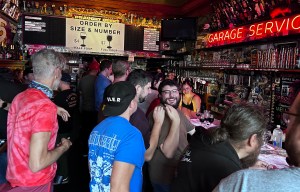
Some argued that if the deal goes through he should be given a chance. Others continued to bemoan his tech background. Nathan Clevenger, an East Bay musician with the Astrolabe Ensemble, posted, “this kind of thing has already rotted out the city that a lot of us loved, and the Toronado represents, among other things, a respite from that for many of us.”
In early May, Toronado sent out invitations to an annual event, “Drinking Day,” scheduled for the 17th. The invite stated that the bar was still for sale – but had not been sold yet, and that founder Dave Keene would be coming into town.
Keene, who has maintained the usual public silence about negotiations for the sale of a business, greeted old friends, sharing memories and some rare bottles. The celebration spilled onto the sidewalk and everything seemed like it had since 1987, like it was all a dream and nothing was ever going to change.
Parrott says the negotiations have hit some “bumps in the road,” but “things are looking good.” He is most excited about the potential to provide tangible membership to Toronado drinkers via a service called lofty.ai which enables fractional real estate investing.
Whoever ultimately becomes the next owner, providing they do want to honor the legacy, will take on not just the building codes, tax rates, and newly acquired debt, but the responsibility to understand what this bar means in a changing city.
To continue as Toronado, the pub and its patrons must keep adapting to a world where quality beer drinking no longer fuels an underground revolution, while somehow continuing to gather people together for some damn nice beers in the incontrovertibly authentic refuge that Dave Keene built.
All About Beer receives support from underwriters who understand and appreciate the importance of independent journalism in the beer space. Please subscribe now and keep the content flowing and fresh.

